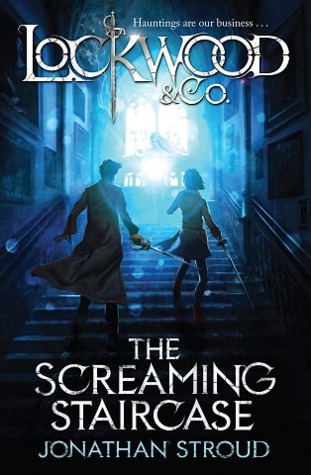I’m a fan of Jonathan Stroud because of his awesome Bartimaeus series from the early 2000s. As part of my quest for literary comfort food during the pandemic, I looked up what he’d written lately. Boy, was I rewarded.
The Lockwood & Co. series describes an alternate universe where, starting in the 1960s, ghost hauntings get much, much worse. As the ghostly epidemic spreads across Britain, private ghost-hunting agencies spring up to keep hauntings in check. Also, only children and teenagers can see ghosts. The result? Ghostbusters, if it had an improbably young staff who also happened to be British. An utter delight.
Teen psychic, Lucy Carlisle, rolls into London looking for work. She eventually finds a position at the Lockwood agency, headed by the mysterious Anthony Lockwood. Over the series, the Lockwood crew diagnose haunted houses, solve murders, and defend the agency’s reputation and integrity. As time goes on, they think they’re on to the cause of the ghost plague.
This series is so wonderful because Stroud treats ghosts like hard magic and works out all the implications to their logical conclusion. For instance, the touch of a ghost causes a heart attack. Ghosts are vulnerable to silver. Ghosts can be contained in silver-lined glass. Suppose you trap a ghost in a silver-glass sphere and load it into a grenade launcher … you got yourself a terrorist weapon.
When members of the largest ghost-hunting agency start getting jobs at DEPRAC, the Department of Paranormal Research and Control, Stroud even examines ghost regulatory capture. These novels are marketed as kiddie stuff, but there’s plenty in here to delight an adult.
They’re also wonderfully morbid – I like Sweeny Todd a little bit too much, and these books are like that. The Lockwood agency has a job opening for Lucy because their previous agent fell off a roof and died. Skull, a possessed skull that the agency keeps around in a jar of broth, is totally the reincarnation of the smart-aleck genie Bartimaeus. Yet the books are oddly heartwarming, too. The main characters are decent people and their problems have solutions. I need more of that this year.
I’m especially fond of Quill Kipps, a 22-year-old who recently lost his psychic powers. Despite his muggle status and insistence he’s not a heroic person, he keeps acting heroically. I think I like him because I am reading this as an uncool 32-year-old. (Stroud so thoroughly convinced me he was going to die at the end, that when he started talking, I thought he was a zombie.)
The series left me feeling like I’ll miss these brave young ghost hunters, and I wish I knew when Jonathan Stroud will publish again.

